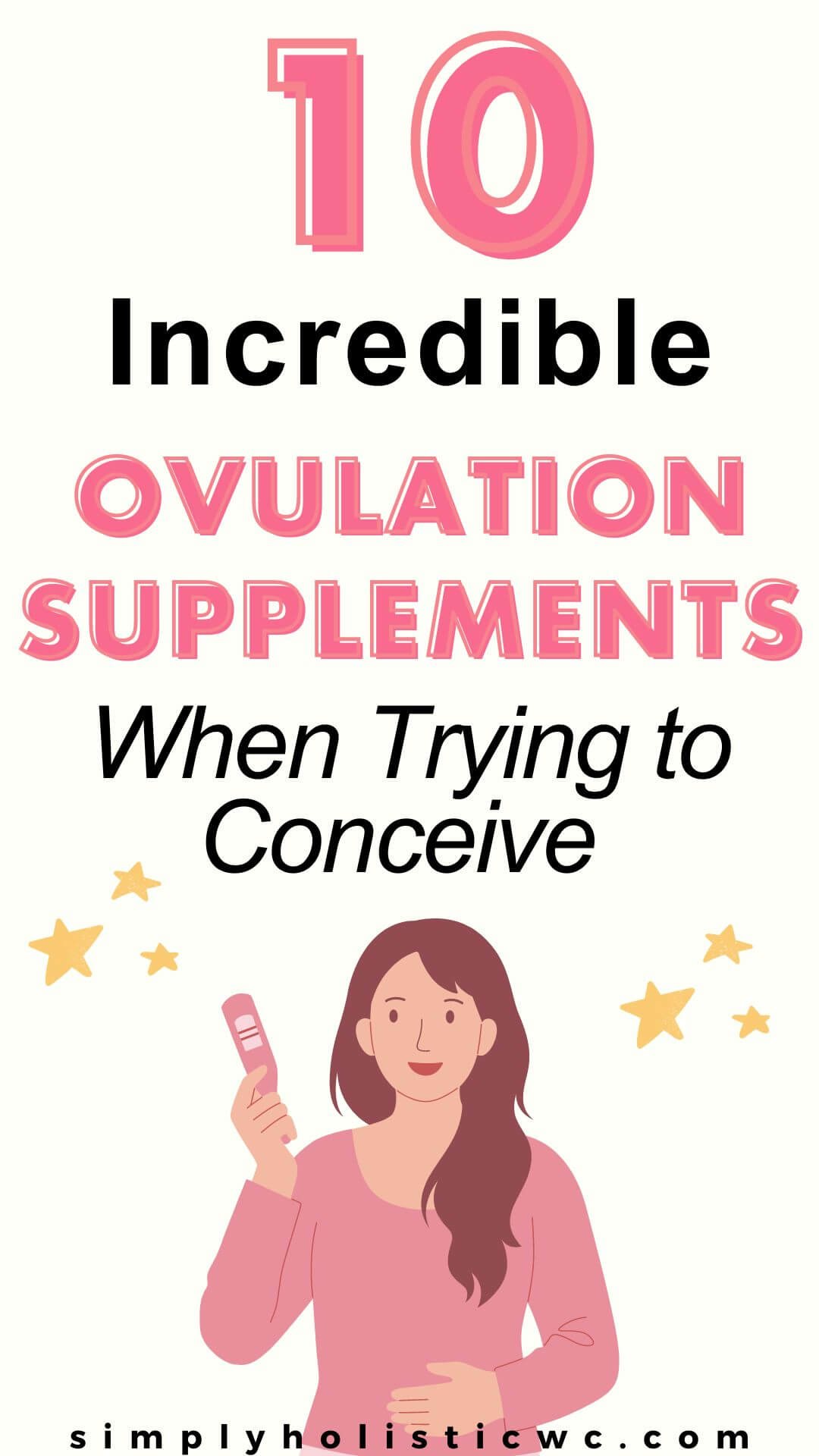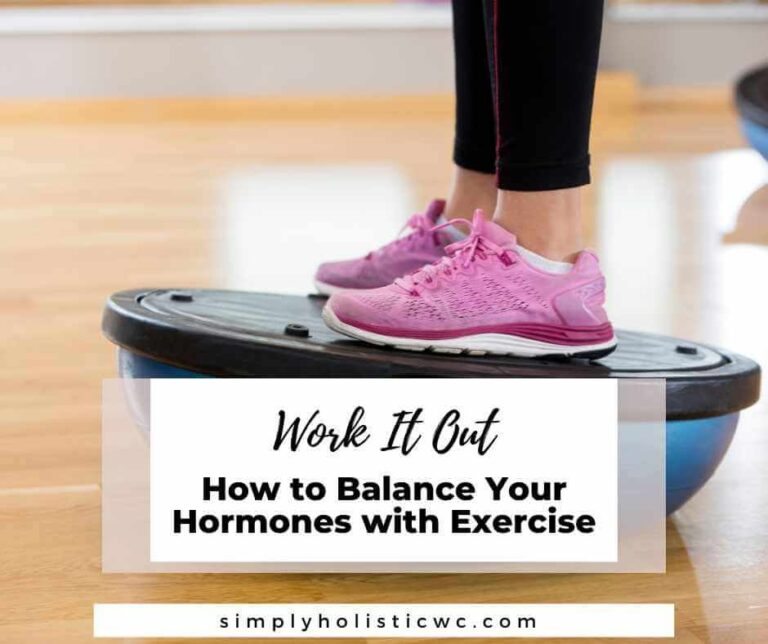Top Supplements to Support Ovulation

Are you looking for natural ways to boost your fertility? You’re not alone.
Many women, including myself, have turned to alternative treatments, such as dietary supplements, to improve their odds of becoming pregnant.
During my own fertility journey, I remember feeling overwhelmed by the endless options and wondering which supplements would truly make a difference.
In this post, we’ll discuss supplements for those trying to conceive.
We’ll look at which supplements are effective, how they work, and what the science says about them. So that when it comes time to consider your options, you have the facts in hand.
Here’s what you need to know before making these decisions on your journey toward parenthood!
This post may contain affiliate links for which I may earn a small commission. This means shopping through these links supports my blog at no cost to you. Please read my full policy. Thank you!
What is Ovulation?
If you’re trying to conceive, you’ve likely heard the term “ovulation” thrown around quite a bit. But what exactly is ovulation, and why is it so important for fertility?
Put simply, ovulation is the process by which a mature egg is released from the ovary. The egg then travels down the fallopian tube, where it may be fertilized by sperm.
Ovulation typically occurs once a month, midway through a woman’s menstrual cycle.
During the first half of the menstrual cycle, the body prepares for ovulation by producing follicle-stimulating hormone (FSH).
This hormone helps stimulate the growth of follicles in the ovaries. These follicles contain eggs that are maturing and preparing for release.
Around day 14 of a typical 28-day menstrual cycle (though this can vary), luteinizing hormone (LH) surges, causing the dominant follicle to rupture and release its egg into the fallopian tube. This is ovulation.
If sperm is present in the fallopian tube at ovulation, it may fertilize the egg, resulting in pregnancy.
If not, the egg will continue through the fallopian tube and be absorbed by the body.
Why is Ovulation Important for Fertility?
If you’re trying to conceive, ovulation is a crucial piece of the puzzle regarding fertility.
Here’s why:
First and foremost, if you’re not ovulating, you can’t get pregnant.
Without a mature egg being released from the ovary, there’s no chance for sperm to fertilize it and create an embryo.
But even if you are ovulating regularly, the quality of your ovulation can still impact your fertility.
For example, if you’re not producing enough mature eggs each cycle, your chances of conceiving may be lower.
Also, if your ovulation is irregular or unpredictable, it can be harder to time intercourse to coincide with your most fertile days.
Luckily, there are steps you can take for fertility support and optimal ovulation to boost your fertility.
Taking supplements is one of those ways!
You May Also Enjoy:
5 Ways to Track Ovulation when Trying to Get Pregnant
What Happens After Ovulation | How Long Until Pregnancy?
The 5 Best Ovulation Tests to Help You Get Pregnant Faster
The Power of Warm Feet: A Simple Trick to Boost Fertility
10 Supplements to Support ovulation
Before we dive into my top picks for supplements to support ovulation, it’s important to note that this article is not intended to be a substitute or medical advice. Please consult a doctor before adding supplements to your routine.
With that being said, here are 10 supplements to support ovulation!
1. OvaBoost
If you’re looking for a supplement that can help support healthy ovulation and egg quality, OvaBoost might be just what you need.
This dietary supplement is specifically designed for women who are trying to conceive.
It contains a blend of vitamins, minerals, and antioxidants that have been shown to improve reproductive function and increase female fertility.
While OvaBoost combines several supplements into one convenient package, there’s always the option to take individual supplements if you prefer.
Plus, if you’re deficient in a certain nutrient, focusing on that specific supplement may make more sense rather than taking a combination product.
That said, many women have found success with OvaBoost, thanks to its ability to support healthy ovulation and egg quality.
So whether you’re looking to boost your fertility naturally or simply want to give your reproductive system a little extra support, this supplement is worth considering.
>>> Shop OvaBoost Here!

2. Prenatal Vitamins
If you’re trying to conceive or are pregnant, you’ve likely heard about the importance of prenatal vitamins.
But what exactly are these supplements, and why are they so crucial for reproductive health and fetal development?
Prenatal vitamins are supplements that are designed for women who are pregnant or trying to conceive.
They typically contain a blend of essential nutrients like vitamin C, folic acid, iron, vitamin E, B vitamins, and calcium.
These are all important for supporting healthy ovulation, promoting fetal growth and development, and reducing the risk of congenital disabilities.
A prenatal vitamin can be a great way to ensure you get all the nutrients you need during pregnancy. But these supplements may not be sufficient for everyone.
If you have specific nutrient deficiencies or need extra support for ovulation, you may want to consider individual supplements in addition to your prenatal.
For example, if you’re deficient in vitamin D (like I was!), you may want to talk to your doctor about taking an extra supplement to support your fertility.
Whether you rely solely on a prenatal vitamin or incorporate extra supplements into your routine, the most important thing is to ensure you’re giving your body the support it needs to optimize your chances of getting pregnant and having a healthy baby.
>>> Shop Prenatal Vitamins Here!
3. Vitamin D
Vitamin D is one supplement that shouldn’t be overlooked when it comes to supporting healthy ovulation.
Not only is this vitamin essential for bone growth, immune function, and hormone regulation, but it can also play a key role in improving reproductive function in women.
One thing I love about vitamin D is it’s relatively affordable and easy to find.
Plus, plenty of high-quality whole food supplements can help you get the vitamin D you need without having to rely on synthetic sources.
>>> Shop Vitamin D Here!
4. Zinc
Zinc is an essential mineral that has a variety of important functions in the body – from supporting immune function and wound healing to promoting cell division and growth.
But probably most importantly for fertility, zinc has been shown to improve reproductive function in both men and women.
By supporting sperm motility and sperm count in men and regulating hormonal imbalances in women, zinc can be an effective supplement for boosting fertility and increasing your chances of conception.
One thing I really like about zinc supplements is that plenty of whole food-based options are out there.
>>> Shop Zinc Here!
5. CoQ10
If you’re looking for a supplement that can help support healthy ovulation and improve your chances of getting pregnant, CoQ10 (also called coenzyme q) is definitely one to consider.
This powerful antioxidant is known for protecting cells from oxidative stress. But it can also have some major benefits when it comes to fertility.
CoQ10 has been shown to improve egg quality and increase fertility in women.
By supporting healthy mitochondrial function within the egg cells, CoQ10 can help ensure that eggs are better able to divide and develop properly. This can make all the difference when it comes to conception.
>>> Shop CoQ10 Here!
Did know that incorporating journaling into your fertility journey can have a powerful impact on manifesting your desires?
Align your energy with your fertility goals by downloading my FREE fertility manifestation journal today!
This tailored journal provides prompts specifically designed to help you manifest your deepest desires while maintaining a positive mindset.
Gain clarity and stay focused on your fertility goals with this invaluable tool.
Click below to get your FREE download and start manifesting your fertility goals with the power of journaling!

6. Omega-3
Omega-3 fatty acids are crucial in general health and have been linked to various benefits – including improved fertility.
One thing to keep in mind is that many omega-3 supplements on the market are fish-based.
If you’re vegan or prefer to avoid fish products, there are still plenty of options available!
One great choice is the vegan omega-3 supplement from Deva, which provides all the essential fatty acids without animal products.
As a vegan myself, Deva is the one I use, and I found it to be both effective and affordable.
Plus, by opting for a vegan omega-3 supplement, you can avoid potential toxins and contaminants that can be present in some fish-based supplements.
This makes it an excellent choice for anyone trying to conceive or already pregnant.
>>> Shop Omega-3 Supplements Here!
7. Folate
Folate is a nutrient that plays a crucial role in fetal development. It has been linked to a reduced risk of neural tube defects.
But folate isn’t just important for pregnant women – it can also play a key role in supporting healthy ovulation and promoting fertility.
By helping to regulate hormone levels and support healthy egg production, folate can be an effective supplement for anyone trying to conceive.
>>> Shop Folate Supplements Here!
8. Myo-inositol
This nutrient has been shown to have various benefits when it comes to fertility, including improving ovarian function and regulating menstrual cycles.
Myo-inositol is particularly effective for women with polycystic ovary syndrome (PCOS) – a condition that can make it difficult to conceive.
Myo-inositol can help regulate ovulation and increase the likelihood of conception by improving insulin sensitivity and hormone levels.
>>> Shop Myo-inositol Here!
9. N-acetyl cysteine (NAC)
This powerful antioxidant has been shown to have various benefits regarding reproductive health – including improving egg quality and reducing inflammation in the reproductive tract.
Also, NAC is particularly effective for women with polycystic ovary syndrome (PCOS) – a condition that can make it difficult to conceive.
By reducing insulin resistance and regulating hormone levels, NAC can help promote regular ovulation and increase the likelihood of conception.
>>> Shop NAC Supplements Here!
10. Vitamin A
While many people think of vitamin A as simply being important for eye health, this nutrient also plays a crucial role in reproductive health.
In particular, vitamin A is important for healthy ovulation and can help improve the chances of conception.
By promoting healthy cervical mucus production and regulating hormone levels, vitamin A can help ensure the conditions are right for fertilization.
Plus, this important nutrient has been linked to improved embryo development and a reduced risk of congenital disabilities.
It’s important to remember that high doses of vitamin A can be toxic. So talk to your healthcare provider before adding a vitamin A supplement to your routine.
>>> Shop Vitamin A Here!

Wrapping it up
There are a variety of supplements out there that can help support healthy ovulation and have a positive effect on fertility.
They can be helpful whether you are undergoing fertility treatments, such as in vitro fertilization, or trying to get pregnant naturally.
From CoQ10 to vitamin A and beyond, each nutrient plays a vital role in reproductive health. They could be just what you need to increase your chances of getting pregnant.
Of course, it’s important to remember that supplements aren’t a magic bullet. And that there’s no guarantee that they will work for everyone.
The best way to boost fertility is through lifestyle changes, such as a healthy diet and exercise.
With that said, adding these fertility-boosting supplements to your routine could be a great way to support healthy ovulation and increase your chances of a healthy pregnancy!
https://my.clevelandclinic.org/health/diseases/14633-abnormal-menstruation-periods#symptoms-and-causes
https://www.ncbi.nlm.nih.gov/pmc/articles/PMC5624332/
https://www.mdpi.com/1422-0067/22/17/9541
https://www.ncbi.nlm.nih.gov/pmc/articles/PMC6480978/
https://www.ncbi.nlm.nih.gov/pmc/articles/PMC4812655/
https://www.ncbi.nlm.nih.gov/pmc/articles/PMC5826784/
https://www.ncbi.nlm.nih.gov/pmc/articles/PMC3717046/
https://www.ncbi.nlm.nih.gov/pmc/articles/PMC3158259/
https://www.ncbi.nlm.nih.gov/pmc/articles/PMC6396757/
https://www.ncbi.nlm.nih.gov/pmc/articles/PMC8158119/
https://www.ccrmivf.com/egg-quality/
https://www.ncbi.nlm.nih.gov/pmc/articles/PMC7940751/
https://www.nature.com/articles/srep10779
https://www.yalemedicine.org/news/fertility-test#:~:text=The%20AMH%20Test&text=The%20level%20of%20AMH%20in,better%20her%20chances%20of%20pregnancy.
https://www.ncbi.nlm.nih.gov/pmc/articles/PMC3984655/
https://www.ncbi.nlm.nih.gov/pmc/articles/PMC8227031/
https://www.ncbi.nlm.nih.gov/pmc/articles/PMC9577027/
https://www.ncbi.nlm.nih.gov/pmc/articles/PMC8541636/
https://www.ncbi.nlm.nih.gov/pmc/articles/PMC9577027/#:~:text=Actually%2C%20NAC%20has%20been%20used,live%20birth%20rate%20(33).
https://www.ncbi.nlm.nih.gov/pmc/articles/PMC8227031/





